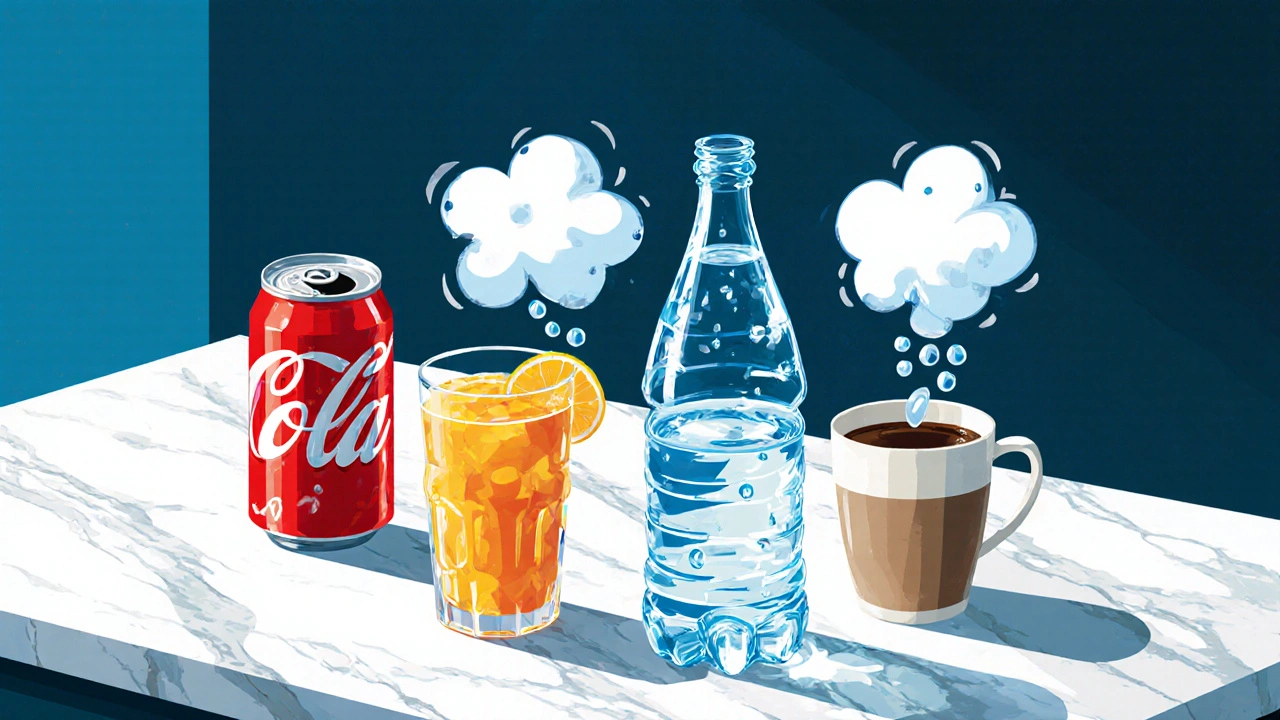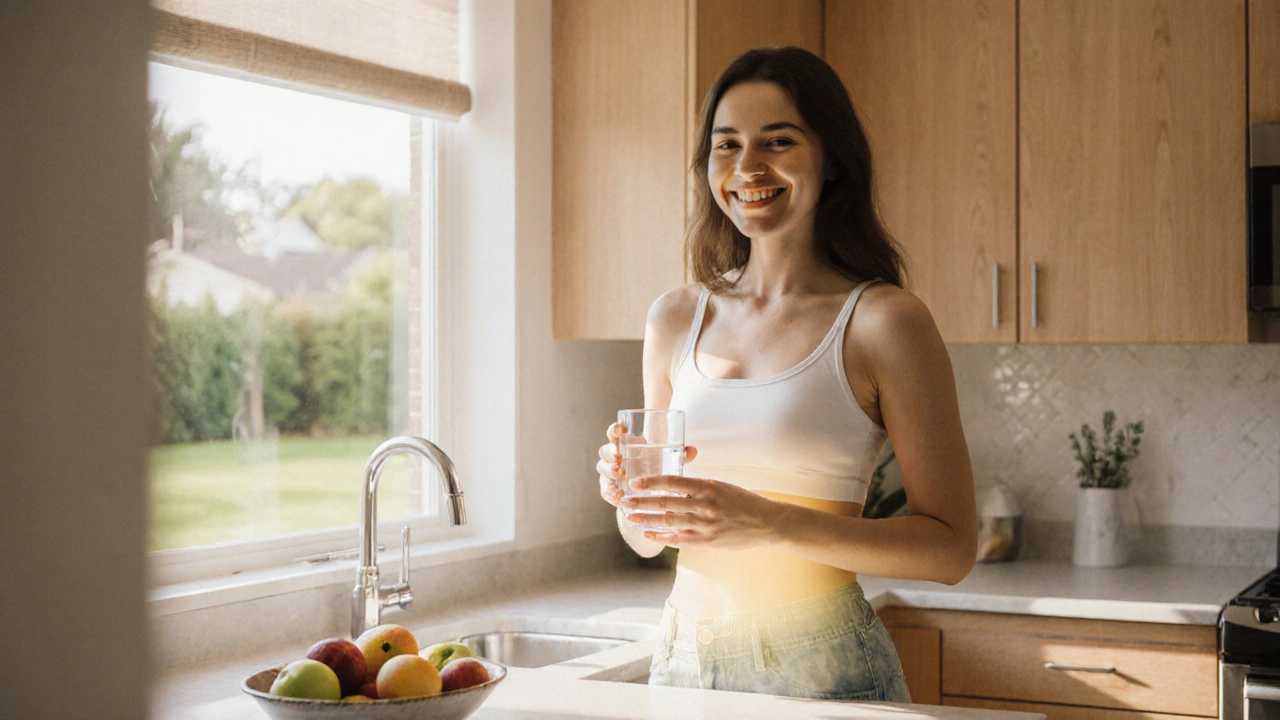Meteorism is a condition marked by excess intestinal gas that leads to abdominal distension, discomfort, and often audible bloating. While many blame beans, carbonated drinks, or stress, recent research shows that drinking water can be a surprisingly simple tool to calm the feeling of pressure.
TL;DR - Quick Takeaways
- Meteorism arises from fermentation, swallowed air, and slowed colon motility.
- Staying well‑hydrated supports regular bowel movements and helps gas move through the gut faster.
- Plain water is neutral; carbonated or sugary drinks can increase gas.
- Aim for 1.5-2 L of water daily, spread across meals and between snacks.
- Seek medical advice if gas is persistent, painful, or accompanied by weight loss.
What Exactly Is Meteorology (Intestinal Gas)?
Most people think of "gas" as the embarrassing sound after a bean binge. In medical terms, intestinal gas is a mixture of nitrogen, oxygen, hydrogen, carbon dioxide, and small amounts of methane produced inside the gastrointestinal (GI) tract. The primary sources are:
- Swallowed air (aerophagia) during eating, drinking, or chewing gum.
- Fermentation of undigested carbohydrates by colonic bacteria.
- Chemical reactions between stomach acid and bicarbonate.
When gas accumulates faster than it can be expelled, pressure builds, leading to the balloon‑like sensation we call meteorism.
How Digestion and Fermentation Create Gas
The digestive process starts in the mouth, where enzymes begin breaking down starches. Most carbohydrate digestion finishes in the small intestine, but fiber and resistant starch pass untouched into the colon. There, fermentation by the resident microbiota splits these carbs into short‑chain fatty acids, hydrogen, and carbon dioxide. The amount of gas produced depends on:
- Type of carbohydrate (e.g., beans vs. white rice).
- Composition of gut bacteria (some produce more hydrogen, others methane).
- Transit time - the longer food sits, the more fermentation occurs.
Thus, anything that slows down colon transit can amplify meteorism.
The Hydration Connection: Water’s Role in Colon Motility
Water is the unsung hero of GI health. It softens stool, facilitates peristalsis, and maintains the mucosal barrier. When you’re dehydrated, the colon reabsorbs more water, producing harder stools that take longer to move. This delay gives bacteria extra time to ferment, creating more gas.
Key attributes of proper hydration:
- Water intake of 1.5-2 L per day (≈8‑10 cups) is generally recommended for adults with moderate activity levels.
- Even distribution throughout the day prevents the "all‑or‑nothing" spikes that can overwhelm the colon.
- Electrolyte balance (sodium, potassium) assists muscle contraction in the gut wall, promoting efficient motility.
Clinical studies from the American Gastroenterological Association (2023) showed that participants who increased daily water consumption by 500mL experienced a 22% reduction in self‑reported bloating scores over four weeks.

Drink Choices: Water vs. Carbonated Beverages vs. Alcohol
Not all liquids are equal when it comes to gas. Below is a practical comparison of common drink categories and their typical impact on meteorism.
| Beverage | Gas‑Promoting Effect | Hydration Level (Water %) | Typical Recommended Intake |
|---|---|---|---|
| Plain Water | Neutral (0) | 100% | 1.5-2L/day |
| Carbonated Soft Drinks | High (+2) | 90% | Limit to <10oz per week |
| Beer (regular) | Moderate (+1) | 95% | ≤1pint per day |
| Fruit Juice (no pulp) | Low (+0.5) | 85% | ≤200mL per day |
Carbonated drinks introduce carbon dioxide directly into the stomach, increasing belching and subsequent intestinal gas. Alcohol, especially beer, can irritate the gut lining and slow motility, adding another layer of bloating.
Practical Hydration Strategies to Ease Meteorism
- Start the day with a glass of water. A 250‑ml cup on waking jump‑starts peristalsis.
- Sip, don’t gulp. Small sips throughout meals prevent excess air swallowing.
- Choose room‑temperature water. Very cold water can temporarily slow gastric emptying. \n
- Pair water with high‑fiber meals. Fiber absorbs water, forming a soft bulk that moves steadily.
- Avoid straw use. Drinking through a straw can increase aerophagia by up to 40% (study, 2022).
- Limit carbonated drinks. Replace soda with infused water (cucumber, mint) for flavor without gas.
- Monitor electrolyte intake. A pinch of sea salt in half a litre of water can aid colon muscle function, especially in hot climates.
For most people, these tweaks make a noticeable difference within a week.
When Water Isn’t Enough - Underlying Conditions
Persistent meteorism despite adequate hydration may signal an underlying disorder:
- Irritable Bowel Syndrome (IBS) - a functional GI condition that often features bloating, pain, and altered stool patterns.
- Small intestinal bacterial overgrowth (SIBO) - excess bacteria in the small intestine that ferment carbs early, producing gas before it even reaches the colon.
- Lactose or fructose intolerance - inability to digest specific sugars, leading to fermentation.
- Gastroparesis - delayed stomach emptying, causing food to sit longer and ferment.
If you notice any of the following, consider a medical review:
- Severe, cramping pain that wakes you at night.
- Unexplained weight loss or nutrient deficiencies.
- Blood in stool or persistent diarrhea/constipation.
Related Topics Worth Exploring
Understanding meteorism opens doors to a broader conversation about gut health. You might also be interested in:
- Probiotic strains that reduce gas production (e.g., Bifidobacterium infantis).
- Low‑FODMAP diet guides for bloating control.
- How stress hormones affect gut motility.
- Non‑prescription antispasmodics and their role in short‑term relief.
Each of these topics dives deeper into the mechanisms that either aggravate or soothe intestinal gas.

Frequently Asked Questions
Can drinking water really reduce bloating?
Yes. Adequate water softens stool and speeds up colon transit, giving gas less time to build up. Studies show a 20‑25% drop in self‑reported bloating after increasing daily water intake by 500mL.
How much water should I drink to combat meteorism?
Aim for 1.5 to 2litres (about 8‑10 cups) spread evenly throughout the day. Adjust upward if you exercise, live in a hot climate, or consume a high‑fiber diet.
Do carbonated drinks make gas worse?
They do. The carbon dioxide you ingest adds directly to stomach gas, and the bubbles can trigger belching and later intestinal distension. Limiting soda, sparkling water, and beer can significantly cut bloating.
Is there a best time to drink water for gas relief?
Start the day with a glass, sip during meals, and finish with a cup before bedtime. This pattern keeps the GI tract moist without over‑filling the stomach, which can otherwise increase swallowed air.
When should I see a doctor about gas?
If gas is accompanied by severe pain, blood in stool, unexplained weight loss, or lasts more than a few weeks despite lifestyle changes, schedule a medical evaluation. These could signal IBS, SIBO, or other conditions that need targeted therapy.


Yassin Hammachi
September 26, 2025 AT 20:23Staying hydrated is more than just quenching thirst; it gently nudges the gut to keep things moving, which in turn lets gas escape before it builds up. Think of water as a silent partner in the digestive dance, softening stool and supporting peristalsis. When you spread your intake throughout the day, you avoid the “all‑or‑nothing” spikes that can overwhelm the colon. So, a steady flow of water can be a simple, low‑risk way to ease that bloated feeling.
Michael Wall
October 3, 2025 AT 16:00People should stop blaming their diet and just drink water, it's common sense.
Christopher Xompero
October 10, 2025 AT 14:40Yo, I swear I've tried every weird hack out there-peppermint tea, yoga poses, even chanting-to kill that gassy monster, and nothing beats a good gulp of plain H₂O. It's like the universe finally decided to give me a break after I chugged that extra half‑liter before lunch. I mean, why do we keep sipping soda when water is basically the hero in disguise? The gut finally calmed down, and I felt like a new man-well, at least my belly stopped sounding like a drum solo.
Honestly, the research backs it up, so stop the drama and just drink up.
Irene Harty
October 17, 2025 AT 13:20One must consider the hidden agendas within the beverage industry, which deliberately obscures the simple truth that plain water can mitigate intestinal distress. The selective promotion of carbonated drinks serves commercial interests, distracting the public from the physiological benefits of adequate hydration. Empirical data from reputable gastroenterological studies demonstrate a measurable reduction in bloating when water intake is increased. Consequently, a critical appraisal of one's liquid choices becomes a subtle act of resistance against corporate misinformation.
Jason Lancer
October 24, 2025 AT 12:00Honestly, the whole thing feels like another hype article-water's great, sure, but does it really solve everything? I get that staying hydrated helps moving stuff along, but I've had days where I drank a gallon and still felt like a balloon. Maybe it's not just water; maybe we're missing other factors like diet composition and stress.
Brooks Gregoria
October 31, 2025 AT 09:40That’s a load of nonsense. People think drinking water is a miracle cure for gut gas, but the real issue is the fermented carbs we load up on. Hydration alone won’t fix a diet that’s basically a fiber bomb. If you want results, cut back on the beans and the sugar, not just chug H₂O.
Sumit(Sirin) Vadaviya
November 7, 2025 AT 08:20Thank you for the balanced overview, Yassin. Your explanation aligns well with the physiological mechanisms I’ve observed in my own practice. Maintaining consistent hydration indeed supports colonic motility, which can reduce the residence time for fermentable substrates. 😊
lindsey tran
November 14, 2025 AT 07:00omg hey michael, i totally get u, water is like super easy but ppl just ignore it!!! i was sooo bloated yesterday till i d id a whole bottle of water and felt like a brand new me. it’s crazy how something so simple can fix sooo much. keep it up!!
Krishna Sirdar
November 21, 2025 AT 05:40I echo Sumit’s point and would add that the timing of water intake matters too. Sipping small amounts during meals can help soften the food bolus, facilitating smoother transit. This practice, combined with a balanced diet, can synergistically lower gas production.
becca skyy
November 28, 2025 AT 04:20Interesting take, Christopher. While the anecdotal flair is entertaining, the core idea that water supports peristalsis holds true. It’s a reminder that sometimes the simplest habits have the biggest impact.
Theo Roussel
December 5, 2025 AT 03:00From a gastroenterological perspective, the osmotic gradient induced by adequate aqueous intake modulates luminal viscosity, thereby optimizing the rheological properties of the chyme. This effect enhances segmental contractions and reduces the dwell time of fermentable substrates, ultimately attenuating colonic gas accumulation.
Erick Masese
December 12, 2025 AT 01:40Your skepticism is understandable, yet the literature consistently demonstrates a statistically significant correlation between increased water consumption and decreased bloating indices. While hydration is not a panacea, it constitutes a foundational component of comprehensive GI health strategies.
Matthew Charlton
December 19, 2025 AT 00:20Exactly, Erick. Think of it as building a solid base-just like in training, you need the fundamentals before tackling advanced techniques. Encouraging people to drink water steadily throughout the day can be the first step toward better gut comfort.
Pamela may
December 25, 2025 AT 23:00Let me unpack this a bit more, because the conversation seems to be skimming over the depth of what hydration really does for our digestive system. First, water isn’t just a passive carrier; it actively participates in the mechanical processes that move food through the intestines. When the colon is well‑hydrated, the stool retains enough moisture to stay soft, which reduces the need for excessive peristaltic force. This, in turn, shortens the time that food residues sit in the colon, limiting the window for bacterial fermentation that produces gas. Second, adequate fluid intake supports the secretion of electrolytes that are essential for smooth muscle contraction. Without those electrolytes, even a well‑hydrated colon can experience dysmotility, leading to a paradoxical increase in bloating. Third, the act of drinking water stimulates the gastrocolic reflex, a natural response that prompts the colon to contract after a meal. This reflex helps clear the bowels and prevents the buildup of gases that would otherwise cause discomfort. Moreover, the psychological aspect shouldn’t be ignored-people who consciously track their water intake often become more mindful of other dietary habits that contribute to gas, like excessive fiber or artificial sweeteners. Finally, consider the broader picture: chronic mild dehydration can contribute to constipation, which is a known risk factor for diverticulosis and other complications. So, while water alone isn’t a miracle cure, it is an indispensable ally in the multifactorial approach to managing meteorism. In practice, aim for consistent, moderate sipping rather than occasional large gulps, and pair it with a balanced diet for optimal results.
tierra hopkins
January 1, 2026 AT 21:40I appreciate the critical view you bring, but I think throwing conspiracy theories into health advice can scare people away from trying simple solutions like staying hydrated. It’s important to separate legitimate concerns from speculation. Let’s focus on evidence‑based recommendations.
Ryan Walsh
January 8, 2026 AT 19:13Totally agree, Tierra. Staying hydrated is a straightforward step anyone can take without fuss.